#I imagine hopper would be their victim most often. that's what you get for living with criminal teenagers when you're a cop
Explore tagged Tumblr posts
Text

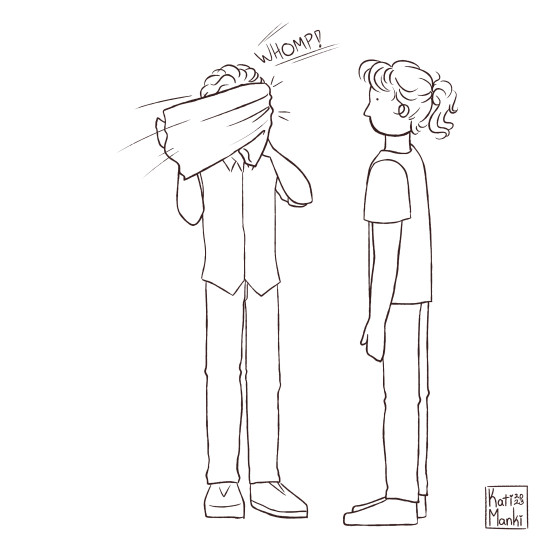
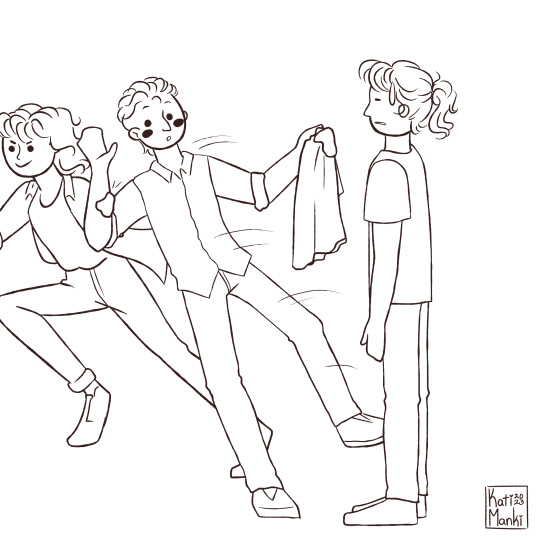

Willel being the be gay do crime twins they are😌 The are committing crimes and pranking their friends and family, and they're wearing their twin club shirts while doing it because they're silly teenagers and I said so😭
(yes I gave them stupid wonder twins club shirts that they made themselves and put their own faces on them. also don't ask me how Will got his shirt over his flannel between the panels)
#willel#byler#byler art#will byers#el hopper#they use the shirts a a sign that they wanna be criminals.#will would be more subtle. put his on and go hang in el's room until she notices. or sometimes handing hers to her#but el is more chaotic for sure😭 just tossing it at him whenever or throwing it in his face when he's trying to flirt with mike#I imagine hopper would be their victim most often. that's what you get for living with criminal teenagers when you're a cop#mike thinks that's hilarious but he's the most often pranked of the party 😔 even after he and will start dating#myart#stranger things#shitbyme
50 notes
·
View notes
Text
i know we always talk about billy easily submitting to his dad but imagine this:
-
neil is charismatic, that must be where billy gets it, because he has the whole town fooled. nobody sees the demonic beast hiding under human flesh.
neil knows all the neighbors by name. he treats the custodian as he treats his boss. he offers help to old ladies with groceries and helps them cross the street.
people wonder why billy seems to glare at his father and disobey him so often; for how good a man neil is, it’s astonishing how resentful billy is of him.
billy will snark back in public, blatantly roll his eyes, flip him the bird when he’s not looking (and leave it up long enough for him to see when he turns).
the party thinks he’s an asshole who hates everyone. steve can’t believe the amount of disrespect he gives his dad. nancy and jonathan are floored at the vulgar words he speaks about him with, how he talks about him to his face.
max is more sympathetic than ever. how neil is so well known and widely liked by the people of hawkins and how nobody would ever even begin to believe a word of the truth billy could tell.
it’s almost like there’s nothing to be done. because as awful as neil is, there’s some days when billy won’t shut his mouth. and it gets him into trouble.
he’s spiteful and vindictive and vulgar when they shout at each other, but once billy is shoved against the wall, it’s a 50/50 chance he’s gonna fight back.
some days he can’t be bothered. is sick and tired of his own life, he lets the one ‘warning’ hit be enough.
other days he shoves back. he always gets shoved harder after. he’ll rile neil up to the point of maximum damage, but it’s so easy to get him angry it’s almost funny.
billy wishes, every time he gets hit, that some random townsperson would just walk into their living room. or kitchen. or billy’s bedroom. or, on one occasion, their back yard.
nobody sees billy hargrove: victim of abuse. they see billy hargrove: hates the nicest man in town. it’s ridiculous and billy can’t stand it.
he’s almost 18 now. he’s sick of hawkins and ready to leave and go anywhere but where his dad is.
but he wants one last joyride on the anger express. maybe ruin a reputation in the process.
so he acts out one day, while they’re walking down the sidewalk from a store max and susan had wanted to look at before grocery shopping.
billy knows how to get under neil’s skin. it’s one of the things he prides himself in knowing well.
he makes an off handed comment about how shitty it is that he’s being dragged into family outings. “we aren’t even a family,” he’ll say.
neil will give him a look. one that says he’s gonna get it when they’re home. where nobody can see who neil really is.
then billy brings up his mother, how she was so much better than neil could ever be. “she made the right decision to leave you,” he snickers as he watches neil’s fists clench.
a myriad of comments follow. ones about how neil is gonna lose another wife. ones about how he still can’t get billy into place. ones about how awful it must be to enjoy hating children.
there’s one more thing that he’s depending on to be the final fuse to make neil explode, right in broad daylight. bringing in the one thing neil hates most in life: “it’s too bad you’ve got a faggot for a son, huh?” billy says, just loud enough to be almost heard by the old lady walking a few steps in front of them.
when neil’s mustache curls into a pained grimace, billy knows he’s won. knows that he’s got the upper hand of the situation, even if he’s gonna get hit for it.
knows, right when the name “william,” comes out, threatening as ever, that he has won.
so he adds fuel to the fire. “do you think red or pink lipstick would look better with my complexion?” just to see the extra line that forms above neil’s eyebrows.
neil stops walking. turns to look at billy. they’re still in the middle of the sidewalk, max and susan a few feet away, stopped as well. max looks like she wants the floor to swallow her whole.
“well, you know, when i become a drag queen, i’ll have to look good, right?” billy asks his father, and it’s like he’s lost control over his own mouth. “so what’ll it be, dad? pink or red?”
and maybe the alarm bells and flashing red lights in billy’s head should have stopped him from talking. maybe he should have let this grocery trip be about getting weekly groceries.
but something about how he could see his fathers breathing speed up and his face turn so pink it’s almost purple, it’s fun.
with the added addition of seeing some of max’s little friends leaving the theatre at that moment.
right when the boys notice max, neil lunges for billy.
the old lady that had been steps in front of them has turned to see what the thud behind her was, only to see neil holding billy by his collar and his neck, shoved against a brick wall, billy’s toes barely touching the floor.
for being in such a compromising position, billy shouldn’t look as smug as he does when the old lady drops her purse with a gasp or when he sees max’s friends’ faces contort with fear. or when he sees harrington exit the movie theatre as well.
it happens quickly, the fight. billy thinks his brain went black and acted on instinct, he doesn’t remember a thing.
but the bystanders see it all. how close neil leans in to sneer something in billy’s face. how billy laughs, then lifts a knee to hit neil where it hurts.
how he stumbles enough for billy to get on his own two feet.
there’s a quick moment where neither moves, then neil rams into billy, but billy keeps his balance well, planted feet and all, and shoved neil back.
within the next minute, they’re both on the floor and alternating who’s got the upper hand. they’re decently matched as opponents, but neil has the upper hand. he’s taken billy down so many times he knows just how to bring him down physically, like how billy can destroy neil with words.
max and susan are backed up another few yards, susan holding max behind her, but not saying a thing. both are too shocked. this has never happened in public.
the party are watching from across the road, and steve feels like he should do something, because neil just slammed billys head into the cement. and he can’t really tell from how far they are, but billy’s nose is sure to be broken.
“call hopper,” steve instructs the party as he moves to walk across the street.
dustin grabs his arm before he can move far. “billy beat you once before, and now there’s like two of him, steve!”
steve walks over anyway. billy had been straddling neil prior, pushing a finger into his shoulder, before being slammed back to the ground.
there’s many different slurs being spewed from neil’s mouth, many of which change steve’s perception of billy entirely, but that’s not important now.
steve gets to where susan and max are when neil gets a grip on billy’s dangly dagger earring and pulls until it rips out of billy’s ear.
susan is staring, horrified at the scene, and max has shoved her face into the pink cardigan her mother wore, peeking out every moment or so.
when she spots steve, she doesn’t feel relived like she hoped she might, she just feels worse. more people don’t need to be involved.
“max, the party’s over there if you wanna...” steve suggests, motioning over his shoulder where the boys are crowded around a pay phone.
max pulls susan along with her across the road, glancing back at steve, who doesn’t seem to know what to do either.
what is he supposed to do? it’s not like dustin was wrong, steve’s never won a fight on his own.
luckily, right as he sees neil stand up and literally stomp as hard as he could on billy’s elbow, backwards, he hears a siren.
sees hopper’s cruiser pull around the corner and feels like a weight is both equally being lifted off his chest and being pushed down heavier.
neil is standing above billy, a few scrapes and forming bruises, ruffled clothes and a tear in the polo he was wearing, but nothing more damaged than his ego.
billy, on the other hand, is laying face down on the concrete, elbow bending in a way that is not natural and half his face covered in blood from both his nose and his ear.
neil looks only mildly frightened by hoppers appearance, and something about it rests uneasy with steve.
steve feels like he’s having an out of body experience as things happen. like he’s only there to observe, which he kinda is, but it’s hazy.
susan comes back, along with the boys following a shaken up max.
another cop, steve thinks it’s callahan, tries to wake billy up, because at some point neil had rendered him unconscious.
neil looks calm while this happens. he has an almost proud air about him as he watches a man try to wake up his son that he’d beaten so bad, he’d passed out.
it makes steve sick.
it also makes steve wonder if this were a semi common occurrence.
billy is driven to the hospital, mostly because his nose is crooked, his ear is still bleeding, and his elbow is most definitely facing the wrong direction, but they also think he may have cracked a rib or two.
neil is driven off in a cop car, callahan’s, while hopper stays to take stories.
it’s news to steve when susan and max share that this has happened multiple times, just never to such a detrimental state.
max recalls the first time that she’d met billy, he’d been wearing a cast on his arm and refused to tell her how he broke it.
steve sees billy in his head. sees the bruises on billy’s back when they’d play shirts and skins and how he’d chalked it up to a childish fight or a fun night with a girl.
sees how billy would favor his left leg for two weeks during basketball, and only wear sweats, but steve had noticed bruising around his right ankle when he’d change his shoes.
sees how billy seems to have insanely good intuition to when people are behind him or when he’s in a crowded place, always on the lookout.
sees, not justification, but a reason behind the way billy acts.
steve can’t imagine, even if his dad was like neil hargrove, having enough nerve to hit him back. even speak rudely towards him.
he recalls all the times he’d seen billy talk shit about his dad or snark at him in public. now he sees them as acts of bravery and defiance from an abuser rather than impolite and hateful towards a parent.
billy’s been fighting this whole time. and he’s been on the right side of the fight.
#stranger things#billy hargrove#neil hargrove#steve harrington#kinda but not really harringrove but imma tag it anyway#harringrove#mw harringrove#mediocre—writing#lol none of this is proof read so good luck#tw abuse#tw domestic violence#tw neil hargrove#tw gore#kinda??
99 notes
·
View notes
Text
MADMAX
ST s02e01 !!!
So I ended up not able to watch until late, because a writing assignment deadline snuck up on me, but I collected up some thoughts. This is my first re-watch of ST ever (I’m not a huge re-watcher usually, I always wait a long while even if I really love something) so a lot of this is, Oh yeah that, but with knowing what comes later :) Here goes!
So I totally forgot, actually, that the Kali gang getaway is the cold open of season 2. Since supposedly the original plan for ST was that Eleven would die at the end of s1 -- and the whole show be an “anthology” series, with a totally different cast in each season -- seeing this now I can imagine the bones of a very different Stranger Things. A different Brenner / Hawkins Lab victim being a character in a new ensemble each year? I mean I’d much rather have the show we actually have, but, interesting.
Dustin’s mom I love her she is so adorable and they are so adorable together
Mike’s reaction to seeing the underwear in Nancy’s drawer 🧐
“You know I despise Dig Dug.”
When Will has his episode in the arcade, seeing the stormy Upside Down: surprising to me how surprised Will isn’t. Later we’re told he had another episode recently. For whatever reason that detail didn’t stick in my memory. It gets me going wondering what Will makes of the Upside Down; he’s obviously had so much more opportunity to wonder about it than I was imagining before.
Just a bit over nine minutes into ep1, season 2′s first “Will! Are you okay?” 🥰🥰🥰🥰🥰🥰🥰🥰🥰🥰🥰🥰🥰🥰🥰🥰🥰🥰🥰🥰🥰🥰🥰🥰🥰
When Murray’s trying to talk with Hopper, that one other cop brings up Troy peeing himself in s1. I know it’s setup for Troy actually showing up later but idk, I always thought it was weird the cop would remember it a year later.
Apropos nothing: Hopper’s “now what” vibe in the office always makes me imagine a Muppet movie version of Stranger Things where David Harbour is the only human actor. I don’t know why.
Steve is Ted. Or in danger of becoming Ted, at least. Talking up working for his dad. “Finger lickin’ good.”
ugh Billy’s here.
I do enjoy the way Billy drives up to the school like he’s a badass, and then the way Max slinks out of his car is like he’s the most cringe parent-dropping-off-kid-at-school ever
Mr. Clarke!!!!!
So we’ve seen Joyce with Will, and Joyce (sewing Will’s Ghostbusters costume and then) with Bob. No Joyce just bein’ Joyce. I know it’s a super-common observation about the way adult women characters are often written that they don’t get their own lives outside of the boys/men they’re close to, but, huh.
Not quite halfway through the episode when Hopper gets to the pumpkin patch, and there’s a solid four or five plot threads begun, without the episode feeling jumbled. (except maybe the kali stuff, but yeah)
“How did you feel when you saw the storm?” I've always liked Dr. Owens, but I’m remembering now how at first I couldn’t decide if he was trustworthy or not. Right now I’m thinking about the DID / Will-created-the-Mind-Flayer theories and wondering how important this question might be after all 🧐
Wow Mike, you’ve had a rough year too. It feels significant to me that Lucas and Dustin aren’t affected along with Will by “the anniversary effect” as hard as Mike is. There’s a bunch going on thematically in that scene of him alone in the basement, too: (literally) putting away childish things (paralleling in my mind the stuff with Will not wanting to grow up in s3!!), trying to get El on the walkie-talkie and calling himself “stupid,” setup for the love/stupid/crazy stuff coming later.
Hopper: “Eight-fifteen, not eight-one-five.” He’s correcting the way Mike taught El to tell time in s1. Huh.
That’s all for now. Loving it so far ^_^ I hope everyone’s had a good day 💖💖
19 notes
·
View notes
Note
What’s ur theories or what you want to see throughout season 3 for stranger things and what can you see for will for his arc
I literally would not be able to discuss every s3 theory I have in one post XD. But I can specify what theories/hopes I have for Will’s story arc in s3.
1) I want Will’s (not supernatural) PTSD to be addressed, as well as he deep-seeded abandoment issues(caused by Lonnie), and low self-esteem to be addressed. He probably blames himself for Lonnie leaving, and causing his family’s financial issues (which will only worsen because of the new mall). Not to mention Will probably blames himself for Bob’s death- the only cannon romantic love interest in Joyce’s life, since Lonnie. Will clearly has a low self esteem and when people ‘leave him’ he blames himself entirely. A good indicator of this, was when Jonathan says he has friends. And Will is confused and says …
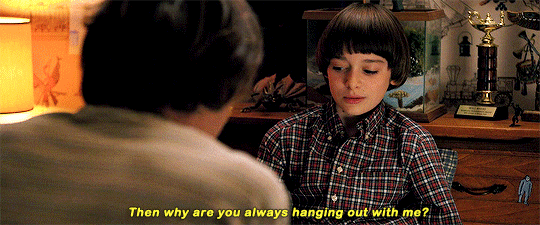
This in itself is extremely telling of how Will views himself. After s1 despite all the kids, teens, and adults doing everything they could to save him (risking their lives to do so) he still doesn’t understand why any of them actual would want to hang around him- he doesn’t see ‘his appeal- his worth’. He doesn’t like himself . He sees himself as a burden, just like his dad perceived him. And because of his abandonment issues, and somewhat iffy social skills, he probably assumes in both s1-2 they saved him out of obligation. And because of his abandonment issues, he’s constantly feeling like a burden and always over-apologizing. And since Will already feels like a burden, because of his dad, his PTSD, and the upside-down incident he’s constantly apologizing .There was a reason Will didn’t tell Joyce what he saw in s1! He yells “I’m sorry “ and snuggles into his mom when he’s trying to explain the mindflayer to Hopper and Joyce. And Joyce says something indicative to his character (before anything supernatural occurs).
Joyce: “You feeling any better? Will?”
Will: “Huh? Yeah… Sorry.”
Joyce: “Hey… what’d we talk about, huh? You gotta stop it with the sorry’s.”
Will : “Yeah, sorry. I mean… yeah, I know.”
This illustrates that Joyce has already discussed the fact that Will over-apologizes . But Will still does it very often, even after these 2 separate discussions.
I think in s3 we’ll see a cumulative reaction to how Will’s experiences have shaped him in a very sad and problematic way. Dustin starts hanging out with Steve, Lucas has a girlfriend, Jonathan will probably be too busy trying to financially support the family/dating Nancy, and to top it all off he then has a fight with Mike about not being “ kids anymore”. I think Mike will lash out, but Will will take the argument much harsher than he usually would (because all of his insecurities are piling up one after the other).So through Will’s perception, he just feels alone and like he’s being abandoned all over again, by the people who he thought would never do this to him.

2) Will’s destroys Castle Byers (Theory). I actually predicted here, that Will would destroy Castle Byers(right after his fight with Mike)- before the track list even came out. I thought this would be the case, because of Castle Byers symbolic importance. Which is why hopefully it’s Will, not some other force that destroys it.
Will uses castle Byers as the one place he feels safe while in the upside down, or just on a daily basis. But it’s still a reminder of his deep-seeded abandonment issues. The day Will’s dad left , Jonathan and Will built Castle Byers all night in the pouring rain. Jonathan saying “we just had to finish it no matter what”. Will was the one who made-up Castle Byers in his imagination, and drew it, before Lonnie even left. He drew the sign “all friends welcome”, because with Lonnie around he never felt ‘welcome’ in his own home. So then when Will goes to Castle Byers in s3 at night in the pouring rain … he’s probably thinking that Mike (and his friends) are going to abandon him just like his dad did!
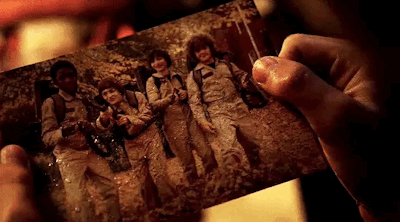

Will wants time to stop, to regain the childhood he lost, but he can’t cry about it now -since he’s officially a teenager . And everyone else is moving on. He feels like he’s being abandoned in a “ teenage wasteland”
So I think Will may in a fit of rage destroy Castle Byers (probably using his fire powers). Similar to how El had a psychic fit and accidentally destroyed all the windows in the cabin.
However unlike the El scene, it quickly turns into something empowering.We’d be sad. But this in itself would be Will at least trying to symbolically move on from his father’s influence, and trying to overcome his abandonment issues. Plus s3 is all about growing up- and if Will destroys the symbol of his childhood-abandonment-issues it would symbolically indicate his change in character as he accepts that he’s now a teenager . As well as how he’ll refuse to be a victim ever again (from his dad, the mindflayer, the bullies, etc)!

Rain in itself can signify “purification of the soul”. I don’t think all of his issues will magically go away- but it’ll be the start of his journey of acceptance & self-love.
3) I want: El to find Will in the woods right after he destroys Castle Byers.
I’ve described in a previous post that based on the symbolism and iconography of the show why Will & El represent Yin and Yang , read more here. One of the many symbols of Yin and Yang is - Yin being representative of feminity/water & Yang being representative of masculinity/fire.
Will is always referenced with fire in both the comic and show . He drew his wizard character shooting fireballs in s1 and in the first ep he rolled the dice and yelled “fireball”, he had the ‘shadow monster ‘ exorcised out of him with fire, and in the comic he shoots a demogorgan and yells “fireball”. El’s element or ‘substance would be the opposite of fire, “water” - the sensory deprivation tanks are filled with water, the void floor is covered in water, she escaped the lab through a drainage pipe, looked at a reflection of herself in a puddle and cased ripples in it using her powers, in s3 is shown sinking in water and falling out of a vanishing tub, etc.
Yin (water) and Yang (fire) have to be “in perfect balance” (if one’s presence is stronger than the other) “catastrophes will occur” and there will be an “imbalance between the cosmic and human realms”. And throughout the 1st two seasons that’s exactly what happened! If El was shown prominantely then Will was gone or unconscious (or vice versa). There is a symbolic tear between the real world and upside down (because of this imbalance). And having them both be there - as a lit fire of castle byers burn, and rain pours would indicate -that their both starting to find balance. And that they’ll finally team up because of the supernatural threat.
Not to mention the last time Will was at his lowest and went to Castle Byers who found him and even read aloud his mantra/ sign of “all friends welcome”? Right, El!

Not to mention in the very 1st episode, the boys went out in the rain to find Will, but found El instead (when she was also at her most scared and isolated).
So it would be ! PURE POETIC CINEMA! DAMIT! They should do it! (El’s house is even in the woods, it all makes sense)! XD
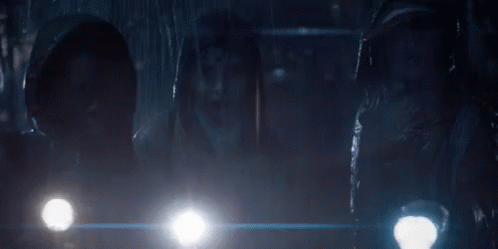
4. I want : El lying for Will
Millie said about s3, that the biggest lie was that “friends don’t lie” ... “everybody lies”. El is still learning what it’s like to ‘be a person in the real world’ and understanding the complexity of familial, romantic, and platonic relationships. And although it’s admirable to never want to lie- it’s much more complicated in the real world. Will (who has very little control of his powers) will probably want to keep it a secret- afraid of how his friends perception of him will change if they knew. So El obliges and keeps Will’s secret- her first lie.
5) I want: Will’s family dynamics evolving
I want to see the love Will has for his mother and brother (and vice versa). But I also want to see the growing pains involved with Will becoming a teenager, striving for independence, and dealing with the supernatural threat and his clear mental health issues. I want to see Joyce, Jonathan, and Will all grow as people- together. -Also Hopper & Will scenes
6) I want: Will to lash out and get angry
Will constantly fears abandonment and because of this he almost never lashes out- he mostly keeps everything bottled up inside. And regardless of whether it’s justified or not- he deserves to have an emotional outburst- where he SCREAMS about all of his frustrations.
7) I want El and Will talking about /experiencing their shared trauma & how they feel about El being the one who first opened the gate
I want to see happy moments for El and Will. But I also want to see El and Will in normal real-life scenarios/situations in s3. Making it more obvious the trauma of their abusive father figures still affects them deeply, and how their PTSD, quiet nature, powers, and the fact that they never had real-childhoods, causes them to feel more socially isolated and depressed than their peers. As they perceive themselves as nothing but burdens and “freaks” to their loved ones , since they’ll never feel “normal”. But they’ll learn to rely on each other.
-Plus how does Will feel about El opening the gate? El in s1 called herself a “monster” and when she couldn’t find Barb and Will, she felt so much guilt- she had to go to the bathroom to cry. Since then Will has had years of his life stolen, gotten Ptsd, possessed, burned alive, (technically) became a murderer, and was forever mutated (we’ll get to that last point later). So I’m just curious how they both feel about the whole ‘gate-situation’?
8) Byler scenes, and Will interacting more with all of his friends (and seeing the distinctions in all of those relationships and how Mike/Will’s dynamic differers from his other guy-friends, or even Will &Max’s friendship). And just having strong platonic relationships. And (not platonic) byler dynamics. I also want to see how he interacts with strangers/bullies in ‘normal’ situations.
9) Theory: I already explained here, that Will, will have a ‘dark phoenix’ moment at the mall releasing his very own mindflayer to protect his friends (right as the US government comes in to see everything).
10/11) Will and El are kidnapped by the government -theory here. However, El willing exposes her identity in order to go with Will and protect him - theory here.
*gifs/pics not mine
60 notes
·
View notes
Text
Batman Loves Superman #2
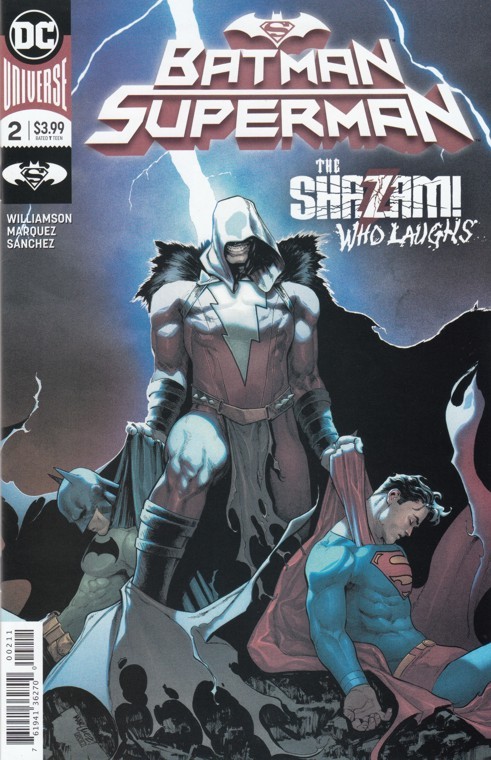
Hey DC! Stop portraying people who laugh as pure evil!
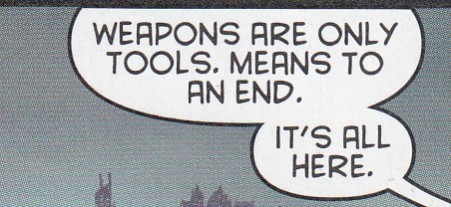
I don't know what genius centrist character speaks first in this comic book but fuck them.
People love to make statements that make them sound above it all. Statements that let them get away with sounding like a logical and rational person while really exposing the terrible things they believe. "Weapons are only tools." The "only" in that statement speaks volumes. They're defending weapons. Weapons are neutral. They're beyond blame. They're innocuous. Their follow-up statement providing evidence to bolster the first statement, "means to an end," shows that they don't give a fuck about context. What "end" are you trying to reach if your tools are weapons? Silverware are only tools as well, a means to an end, but we know that the end reached by silverware almost certainly is simply an empty tub of ice cream as opposed to a school full of murdered children. Oh no! Look at me bringing up murdered children to play on the emotions of the audience! How dare I bring in a real world example of an end that the means of these mere tools brings about! If your defense of weapons are that they're simply tools to be used to reach a particular end, you can't just ignore that the "end" you're discussing in the most general terms is violence. Weird that people who can't wait to be attacked so they can kill somebody and prove that their choice to carry a weapon was the right one often try to distance themselves from the inherent violence of their beloved weapon. The person speaking is Commissioner Gordon who laughed last issue so he's obviously a monster. I guess he's trying to point out that the real evil has been locked away at Arkham and the tools the evil people used aren't dangerous on their own which is why they've been locked in an armory outside Gotham City. He's come to liberate them with the help of a mystery person who has a sort of claw hand (Black Condor?!). A good writer would reveal who it was because they know that would get the reader really excited about Batman and Superman's confrontation with them. A good writer continually gives up surprising information. A mediocre writer hides as much as possible from the reader because it's the only way they can make a story suspenseful. Meanwhile, Shazam has begun calling himself "Earth's Mightiest Nightmare." See, he usually calls himself "Earth's Mightiest Mortal" so you can see how hilarious his wordplay is. But don't laugh because you don't want to appear wicked to the people around you.
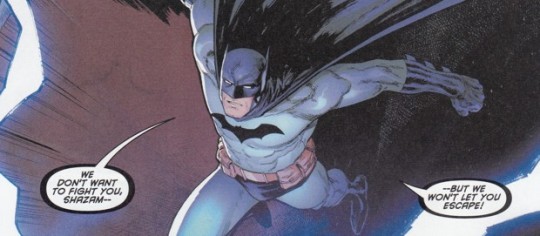
Bullshit. Batman absolutely wants to fight him.
Shazam uses his magic lightning to try to destroy Batman but Batman just dodges because he probably trained with Himalayan Lightning Dodgers years ago. When Shazam uses his magic for evil, The Phantom Stranger's nose bleeds and Zatanna gets severe cramps. I guess magic in the DC Universe is like the Force in Star Wars. It's disturbing and shit. Superman almost gets the upper hand but, as I pointed out how the exciting battle might go last issue, Shazam turns back into Billy Batson to remind Superman he's fighting a child. So Superman is all, "Aw, shucks! I didn't mean nothing! You can fight it, Billy! Stop finding things funny!" But then Shazam is all, "SHAZAM! Fooled you!", and Superman is all, "D'oh!", and Batman is all, "SMDH." But remember! Batman is the king of the DC Universe! So he's definitely got a way to stop Shazam. I bet he's got a Bat-Monkey's Paw in his belt with two wishes left on it. Batman doesn't like to talk about the first wish and why Alfred now has to care for that tiny pianist living in the terrarium in the study. Batman doesn't use his Bat-Monkey's Paw to save the day but if you thought that idea was completely ludicrous, you'd better prepare your mind for Joshua Williamson's solution.
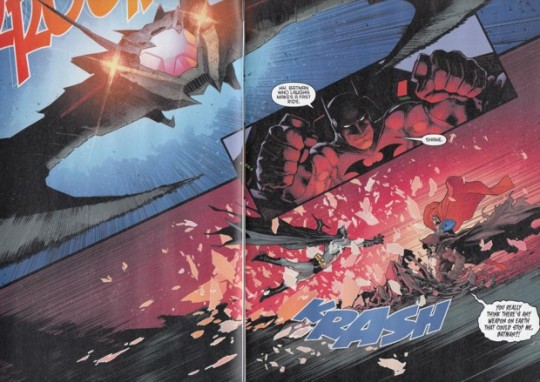
Batman finds the Batman Who Laughs Batwing, flies it up in the sky where Superman and Shazam are battling, and then, um, I don't know. He launches himself out the cockpit window against the g-forces of the accelerating Batwing? I suppose Batman learned to do this while training with the Sheep Hoppers of Aberdeen?
Um. Wait a second. Is Batman the greatest detective or am I because I think I just solved the mystery of the six heroes turned into Heroes Who Laugh.
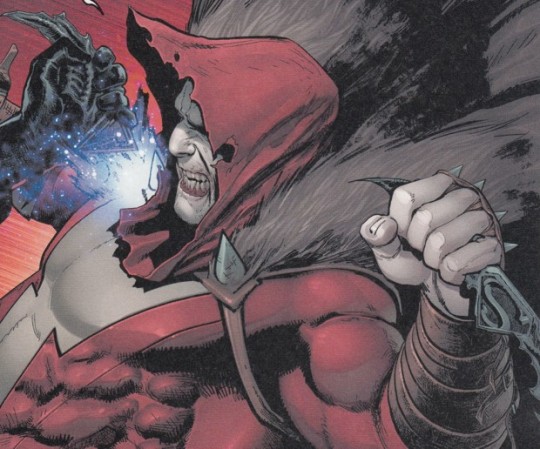
The poison batarangs all have the symbols of the hero they're meant to infect on them! Just look more closely at the molds you found, idiots!
Shazam escapes because Superman held back and because Superman had to save Batman after Batman thought he could beat Shazam by crashing through the sturdy glass of a jet's cockpit while it was accelerating while only having a boomerang as a weapon. I guess Batman is only as smart as the writer writing him. He should have used his fucking Bat-Monkey's Paw. Later at the Bermuda Triangle Fortress of Solitude, Batman and Superman note that each Batarang Who Laughs has been infused with a specific Batman Who Laughs Juice based on the DNA of the intended victim. What they don't notice is that the Shazam one was a lightning bolt on it and the Superman one has the Kryponian symbol for hope (I know. Lame back story on the "S" on Supe's chest) on it and that they found the fucking molds for six Batarangs Who Laugh. Which means the answer to who else has been infected is in their stupid hands! Unless I'm supposed to believe that the symbols were carved onto the Batarangs Who Laugh after the fact. Which I totally don't even though that would probably be the way to do it seeing as how you're probably going to want to eventually make more than just six heroes laugh. My real opinion on this situation is that Joshua Williamson didn't actually think it through very well. Batman and Superman don't know what to do so they decide to pretend Superman was infected by Shazam. Shazam knows he didn't infect Superman but I'm sure he won't say anything to the Good Guys Who Laugh and ruin Batman and Superman's surprise when Superman goes undercover to work with the Batman Who Laughs. I'm sure failing to infect Superman so that Superman would have to pretend he's the Superman Who Laughs and thus free the Batman Who Laughs so he can find out the Batman Who Laughs plans is totally the Batman Who Laughs' plan. Because whatever the heroes do to stop the bad guys in the beginning of a story is always exactly what the bad guy knew the good guy would do. They're evil geniuses, remember! And Batman and Superman fell for it! Batman Loves Superman #2 Rating: C. If you didn't read this comic book yourself for a real world example, let me tell you how a mediocre writer writes a comic book: first, the bad guy attacks the heroes rather than doing something criminal or evil while trying to avoid the attention of the heroes. That's because a mediocre writer doesn't know how to write heroes discovering crimes being committed and instead need the villain to wave a lot and shout and say, "Hey! Jerks! I'm doing crime!" Or, better yet, have the criminal's entire plan simply be "I will antagonize the heroes for petty vengeance!" After that, the heroes will fail to stop the criminal. Depending on how long the story is, the heroes will either have to redouble their efforts and super believe in themselves to rally and win the day or the heroes will begin plans to defeat the villain. If they begin plans which make them seem like they're getting the upper hand, those plans will always be exactly what the villain wanted to happen in the first place. The heroes will then be defeated again just when they thought they were going to win! At that point, they'll probably need to do the rallying thing where they just fight a little bit harder than they did before and believe a little bit more than they believed before to show their strength of character and will. Because good always has stronger will and greater strength of character than evil! I really wish a writer would simply come up with a genius plan by the villain that isn't simply the villain saying, "They're falling right into my plans," after whatever the fuck bullshit the writer wrote. How these evil geniuses can plan such complicated and intricate plans that rely on knowing exactly what every hero is going to do is beyond my limited comprehension. I might even say it's contrived bullshit!
2 notes
·
View notes
Link
Fame, if you win it, Comes and goes in a minute.
— Jule Styne, Betty Comden, and Adolph Green, “Make Someone Happy”
The pure products of America go crazy.
— William Carlos Williams, “To Elsie”
¤
DRIVE DOWN some of Hollywood’s major thoroughfares or visit some of its celebrated tourist attractions, like Grauman’s Chinese Theatre, and you’re bound to see at least one mural featuring bona fide pop icons like Marilyn, Elvis, and James Dean. Depending on the artist, the players joining Marilyn might include Sinatra, John Wayne, or Chaplin. If Duke Haney, the author of Death Valley Superstars, commissioned his own mural, the Hollywood Chamber of Commerce might not approve. Yes, Marilyn would still be there, but her supporting cast would be a bunch of troublemakers as obscure as she is famous — Steve Cochran, Sean Flynn, Mark Frechette, Christopher Jones — as well as the notorious Lee Harvey Oswald and William Desmond Taylor, the victim of one of Hollywood’s greatest unsolved mysteries.
The personalities on Haney’s mural are just some of the subjects he profiles in his engrossing new collection of essays, Death Valley Superstars: Occasionally Fatal Adventures in Filmland. All but one of Haney’s pieces were originally published on Brad Listi’s literary website The Nervous Breakdown, where I discovered his work in December 2013. Familiar with Haney’s experience writing screenplays and acting in low-budget films, Listi, who had published Subversia (2010), Haney’s first collection of essays, invited him to begin writing about Hollywood. Haney twice demurred, not wanting to be known as just another Kenneth Anger. “I had been struggling to start a novel for two years to no effect,” Haney recently told Listi on his podcast, “and it might rejuvenate me to work instead on a quirky tour of a neglected career and colorful life [tough guy actor Steve Cochran] — an appreciation with elements of biography.” He accepted Listi’s invitation and began writing biographical essays on some of destiny’s darlings, and a number of also-rans who briefly achieved a measure of fame only to see it undone by scandal, misbehavior, or malign fate. Superstars isn’t restricted to luminaries of the screen: Hugh Hefner, Jim Morrison, and the aforementioned Lee Harvey Oswald show up in its pages. Haney’s deep research, fresh insights, and engaging prose bring these subjects to life. He also includes several lively accounts of his own experiences working for legendary cheapjack producer Roger Corman and even more marginal Hollywood operators.
Haney leads his book with a powerful memoir, “When Dinosaurs Ruled the Earth,” a real cri de coeur recalling how the New Hollywood films of the ’70s celebrated in Peter Biskind’s book Easy Riders, Raging Bulls inspired him to journey to Hollywood to make the same kinds of films, only to discover that the blockbuster success of Star Wars and its successors had already killed the New Hollywood movement, torpedoing the career Haney had imagined for himself in Charlottesville, Virginia, where he had immersed himself in movies screened at the palatial Paramount Theater and a local revival house. There, he discovered the Holy Trinity of Method acting — Marlon Brando, Montgomery Clift, and James Dean — and their ’70s equivalents — Al Pacino, Robert De Niro, Jack Nicholson, and Dustin Hoffman — all of whom he had hoped to emulate once he hit Hollywood.
Haney’s essay could easily be titled “Star Wars and Its Discontents.” He spends a hefty chunk of “Dinosaurs” expounding on the detrimental effect of that beloved franchise. Star Wars did more than merely change Hollywood’s commercial ecosystem, infantilizing movies. It became a cultural Death Star, Haney contends, whose puerility pervaded society, reducing adults to Peter Pans who are not ashamed to line up at the box office for movies that would once have been considered strictly kid’s stuff and to buy “adult” coloring books.
In the powerful conclusion of “Dinosaurs,” Haney recalls his childhood self going to see a movie (When Dinosaurs Ruled the Earth [1970]) for the first time:
I can picture him now, about to see a movie alone for the first time. He walks up the long corridor, carpeted in red, of the Paramount Theater, pausing at the concession stand to gawk at thumbnail photos of the posters for sale, and a voice in his head says, Don’t look. God doesn’t want you to look. But the voice is quiet in the darkness of the auditorium, where the boy watches a girl in a fur bikini cavort anachronistically with a dinosaur, and the boy thinks, Man, I would love to be that dinosaur, never dreaming that, when he’s a man, a dinosaur is just what he’ll be.
Someone once wisely said that participation in sports doesn’t create character, it reveals it. The same can be said of the effects of fame and its pursuit, something personified by Marilyn Monroe and Lee Harvey Oswald, Haney’s most famous subjects. They were both pathetic wretches who thought that fame would enable them to escape the pain of anonymity. Monroe was a perpetually unhappy woman who never knew her father and whose mother had a disordered mind. The response she got for modeling for some rather chaste cheesecake photos set her direction. With considerable effort, she became a worldwide sex goddess, but her fame only exacerbated her unhappiness. She finally found release in a bottle of Nembutal one lonely night.
In “Golden State Girl,” Haney argues that Monroe was a genuine artist whose greatest creation was her inimitable screen persona. “There’s no pathos in the image they propose,” Haney writes, after describing several instances of her hateful behavior,
but there’s pathos aplenty in the image of Marilyn as a wounded stray, as the candle in the wind of Elton John song, as a martyr of celebrity, of Hollywood, of men and patriarchy and the male gaze. This image — and it’s finally a single image — excludes those traits it can’t, and doesn’t want to, accommodate: opportunism, toughness, willfulness, petulance, all of which, and then some, can be found in a convoluted woman with a genius for appearing the opposite.
Lee Harvey Oswald was born two months after his father died. His mother was a kook. He believed that he deserved to be a major actor on the stage of history, not just some nobody sweating his life away stacking boxes of schoolbooks in an old warehouse. The secret delight he must have enjoyed after making himself the focus of the world’s attention lasted only two days before a .38 bullet in his belly ended his life. In “Oswald Has Been Shot,” Haney explores the possibility that three movies that Oswald saw — We Were Strangers (1949), Suddenly (1954), and The Manchurian Candidate (1962) — may have inspired him to kill the president.
As his essay on Oswald demonstrates, outsiders fascinate Haney. And that fascination extends to Hollywood’s outsiders, the nearly forgotten actors who were deserted by fame in their own lifetimes. Haney is their champion. In Superstars, he tells the stories of Sean Flynn, Mark Frechette, Steve Cochran, and Christopher Jones in captivating detail and provides us with the most complete biographies these men are ever likely to get.
Sean Flynn inherited the handsomeness of his father, legendary screen swashbuckler Errol Flynn, but lacked his casual élan in front a movie camera. Sean sought adventure as a photographer in war torn Vietnam and Cambodia, where he disappeared in 1970. Steve Cochran possessed a kind of oily charisma that suited his portrayals of shady characters in films like White Heat (1949) and Private Hell 36 (1954). He was an uncomplicated man who cared only for masculine luxuries — exotic sports cars and boats — and women: he had an insatiable sexual appetite. He could also be physically violent with them. He died horribly when a mysterious disease suddenly struck him as he was sailing his yacht Rogue in the waters off Guatemala, while a crew of barely legal Mexican women he had hired to help him promote a film project could only look on helplessly.
Mark Frechette never wanted to be an actor. He didn’t know what he wanted to do until he fell under the spell of cult leader Mel Lyman in Boston. After a talent scout for director Michelangelo Antonioni spotted Frechette in New York, Antonioni cast him as a campus radical running from the law in Zabriskie Point (1970). Frechette often sparred with Antonioni during the shoot. It didn’t matter; he was only doing it for Mel. Frechette’s misbegotten idea of a revolutionary political statement was to rob a bank, which got one of his accomplices killed. Frechette died in prison when a barbell fell on his neck, asphyxiating him. He was only 27.
Christopher Jones rocketed to stardom in only his second film, Wild in the Streets (1968), a political fantasy about a 22-year-old rock star who becomes president. He bore a striking similarity to James Dean, with the same mesmeric ability to seduce an audience. Jones quit acting abruptly after filming Ryan’s Daughter (1970) and became an enigmatic recluse until his death in early 2014 at age 72. In what may be the most fascinating piece in Death Valley Superstars, Duke Haney does much to unravel the shadowy mystery of Jones’ post-Hollywood years for the first time.
“I think Hollywood is the true Death Valley,” says Haney, “because it’s where dreams go to die, and sometimes the dreamer.” Fortunately, Haney is still with us — and we owe him our thanks for Death Valley Superstars, a dream of a collection.
¤
Peter L. Winkler is the author of Dennis Hopper: The Wild Ride of a Hollywood Rebel (Barricade Books, 2011) and the editor of The Real James Dean: Intimate Memories from Those Who Knew Him Best (Chicago Review Press, 2016).
The post Hell Down in Hollywood: On Duke Haney’s “Death Valley Superstars” appeared first on Los Angeles Review of Books.
from Los Angeles Review of Books http://bit.ly/2UITses via IFTTT
0 notes